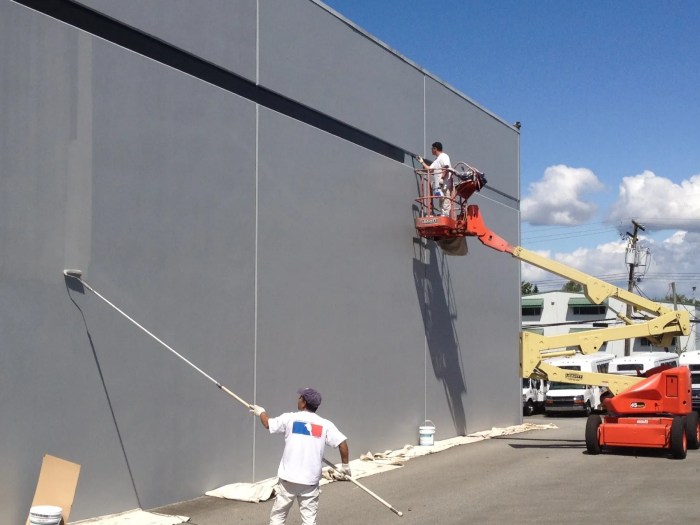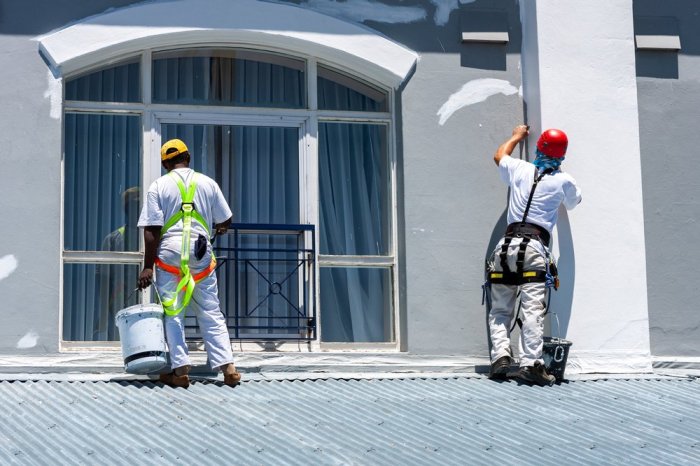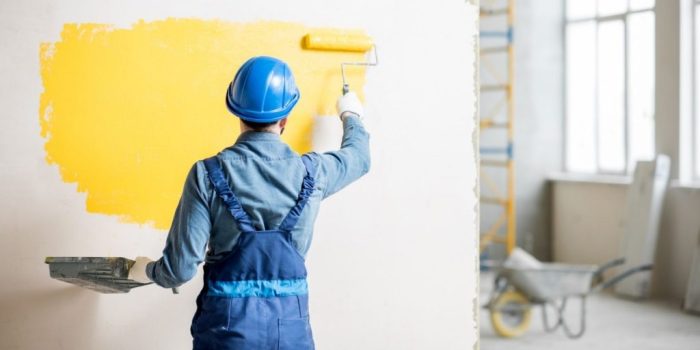Commercial Services
Crafting Success: Tips for Hiring Commercial Painting Contractors

When it comes to commercial painting contractors, their role in the construction industry goes beyond just adding color to walls. These professionals play a vital part in transforming spaces and enhancing the overall aesthetic appeal of commercial properties. Let's delve into the world of commercial painting contractors and uncover what makes them essential for any project.
As we navigate through the realm of commercial painting contractors, we will explore the qualifications, skills, types of projects, tools and equipment, safety measures, regulations, as well as cost estimation and budgeting involved in their work.
Introduction to Commercial Painting Contractors
Commercial painting contractors play a crucial role in the construction industry by providing professional painting services for commercial buildings and facilities. These contractors are highly skilled and experienced in handling large-scale projects, ensuring quality workmanship and timely completion.
Importance of Hiring Professional Commercial Painters
It is essential to hire professional commercial painters for projects to ensure a high standard of work and attention to detail. Professional painters have the expertise and knowledge to recommend the best paint materials and techniques for each specific project, resulting in a durable and aesthetically pleasing finish.
Typical Services Offered by Commercial Painting Contractors
- Surface Preparation: Commercial painting contractors are responsible for preparing surfaces by cleaning, sanding, and priming to ensure proper adhesion of the paint.
- Painting and Finishing: These contractors apply paint using various methods such as spraying, rolling, and brushing to achieve a smooth and even finish.
- Color Consultation: Commercial painters often provide color consultation services to help clients choose the right color schemes for their commercial spaces.
- Protective Coatings: In addition to standard painting services, commercial painting contractors may offer protective coatings to extend the lifespan of the paint and protect surfaces from damage.
Qualifications and Skills
Commercial painting contractors need to meet specific qualifications and possess essential skills to excel in their work.
Necessary Qualifications and Certifications
- Valid contractor's license
- Insurance coverage
- Knowledge of safety regulations
- Understanding of building codes
- Certifications in lead-based paint removal (if required)
Essential Skills
- Attention to detail
- Ability to work with various tools and equipment
- Color matching and blending skills
- Excellent communication skills
- Time management and organizational skills
Role of Experience
Experience is crucial for commercial painting contractors as it allows them to handle different projects efficiently, troubleshoot issues, and deliver high-quality results. Experienced painters are familiar with various surfaces, techniques, and materials, enabling them to provide expert advice and ensure customer satisfaction.
Types of Commercial Painting Projects
Commercial painting contractors often take on a variety of projects ranging in size and complexity. These projects can include painting interior and exterior surfaces of various commercial buildings, structures, and facilities.
Large-Scale Commercial Painting Projects
- Office Buildings: Painting the interior and exterior of office buildings is a common large-scale project for commercial painters. This may involve multiple floors, extensive surface area, and specialized coatings for high-traffic areas.
- Retail Spaces: Retail spaces such as shopping malls, department stores, and boutiques often require painting services to maintain a fresh and inviting appearance for customers.
- Hotels and Resorts: Painting projects in hotels and resorts can be extensive, covering guest rooms, common areas, restaurants, and recreational facilities.
Challenges and Considerations in Commercial Painting Jobs
- Surface Preparation: Proper surface preparation is crucial for a successful commercial painting project, especially when dealing with large areas or challenging surfaces.
- Time Constraints: Many commercial painting projects need to be completed within a specific timeframe to minimize disruptions to business operations.
- Safety Regulations: Commercial painters must adhere to strict safety regulations, especially when working at heights or in hazardous conditions.
- Environmental Factors: External painting projects are often affected by weather conditions, requiring careful planning and scheduling to ensure optimal results.
Tools and Equipment
Commercial painting contractors rely on a variety of tools and equipment to successfully complete their projects. These tools are essential for achieving high-quality results efficiently and safely.
Essential Tools
- Paintbrushes and rollers
- Spray guns
- Ladders and scaffolding
- Drywall repair tools
- Sanders and scrapers
Advanced Painting Tools
Using advanced painting tools is crucial for commercial projects due to the scale and complexity of the work involved. These tools help contractors work faster, more accurately, and with better precision.
- Airless paint sprayers
- Power rollers
- High-volume low-pressure (HVLP) sprayers
- Digital color matching systems
Impact of Technology
Technology has significantly impacted the tools and equipment used in commercial painting. The introduction of digital color matching systems has revolutionized color accuracy, while advanced sprayers have increased efficiency and reduced waste in painting projects. These technological advancements have helped commercial painting contractors deliver better results in less time.
Safety Measures and Regulations

Commercial painting contractors must prioritize safety on job sites to prevent accidents and injuries. It is crucial for them to follow specific safety measures and comply with regulatory standards to ensure a safe working environment for themselves and others.
Safety Measures on Job Sites
Proper safety measures on job sites include wearing appropriate personal protective equipment (PPE) such as gloves, goggles, and masks, ensuring proper ventilation in enclosed spaces, using ladders and scaffolding correctly, and implementing proper handling and disposal of hazardous materials.
Regulatory Standards and Requirements
Commercial painting work is governed by various regulatory standards and requirements set by organizations such as OSHA (Occupational Safety and Health Administration) and EPA (Environmental Protection Agency). These regulations cover aspects like lead paint removal, proper waste disposal, and worker safety protocols.
Importance of Safety Training and Compliance
Proper safety training is essential for commercial painting contractors to understand and implement safety measures effectively. Compliance with regulations not only ensures the well-being of workers but also helps avoid legal issues and penalties. By prioritizing safety, contractors can maintain a positive reputation and build trust with clients.
Cost Estimation and Budgeting

When it comes to commercial painting projects, cost estimation and budgeting play a crucial role in ensuring the success of the project. Commercial painting contractors typically go through a detailed process to estimate costs accurately and create a budget that meets the client's requirements.
Factors Influencing Budgeting Process
- Size of the Project: The total area to be painted is a significant factor in determining the overall cost of the project. Larger projects will require more materials and labor, leading to higher costs.
- Surface Preparation: The condition of the surfaces to be painted can greatly impact the budget. Extensive surface preparation, such as repairing cracks or removing old paint, can add to the overall cost.
- Type of Paint and Materials: The quality and type of paint and materials chosen for the project will affect the budget. Higher quality paints may cost more initially but can provide better durability and longevity.
- Accessibility and Complexity: Factors such as the height of the building, obstacles in the painting area, and intricate details can impact the budget. Special equipment or additional labor may be required for challenging projects.
- Timeline: The timeframe for completing the project can influence costs. Tight deadlines may require overtime work or additional resources, which can add to the overall budget.
Tips for Effective Budgeting
- Get Multiple Quotes: It's essential to obtain quotes from different commercial painting contractors to compare prices and services. This can help you determine a realistic budget based on market rates.
- Communicate Clearly: Clearly communicate your expectations and requirements to the contractor to avoid any misunderstandings that could lead to additional costs later on.
- Plan Ahead: Proper planning and scheduling can help you avoid rush fees and unnecessary expenses. Create a timeline for the project and stick to it to stay within budget.
- Consider Long-Term Value: While it may be tempting to opt for the lowest bid, consider the long-term value of the project. Investing in quality materials and workmanship can save you money in the long run.
Closing Summary

In conclusion, commercial painting contractors are the unsung heroes behind the vibrant facades of our favorite businesses. Their expertise, precision, and attention to detail contribute significantly to the success of any commercial painting project. By understanding the intricacies of their work, clients can make informed decisions when hiring these professionals for their next endeavor.
Common Queries
What qualifications are required for commercial painting contractors?
Commercial painting contractors typically need certifications in painting techniques, safety training, and sometimes specialized skills like working at heights.
How do commercial painting contractors estimate project costs?
They consider factors like surface area, type of paint, labor costs, and any special requirements to provide an accurate cost estimation.
What safety measures do commercial painting contractors follow?
They adhere to safety guidelines like using protective gear, securing ladders, and ensuring proper ventilation in work areas to prevent accidents.
-

 General8 months ago
General8 months agoFinding the Best Siding Contractors Near Me: A Comprehensive Guide
-

 General8 months ago
General8 months agoExploring the World of Interiors
-

 General8 months ago
General8 months agoEnhancing Your Home: Custom Home Exteriors
-

 General8 months ago
General8 months agoExploring the Roof Replacement Cost Estimate: Factors, Materials, and Labor
-

 General8 months ago
General8 months agoThe Ultimate Guide to Licensed Home Improvement Contractors
-

 General8 months ago
General8 months agoExploring the Beauty of Hardie Cobblestone
-

 Architecture8 months ago
Architecture8 months agoExploring the World of Interior Architecture
-

 General8 months ago
General8 months agoExploring the Best Replacement Window Companies for Your Home





